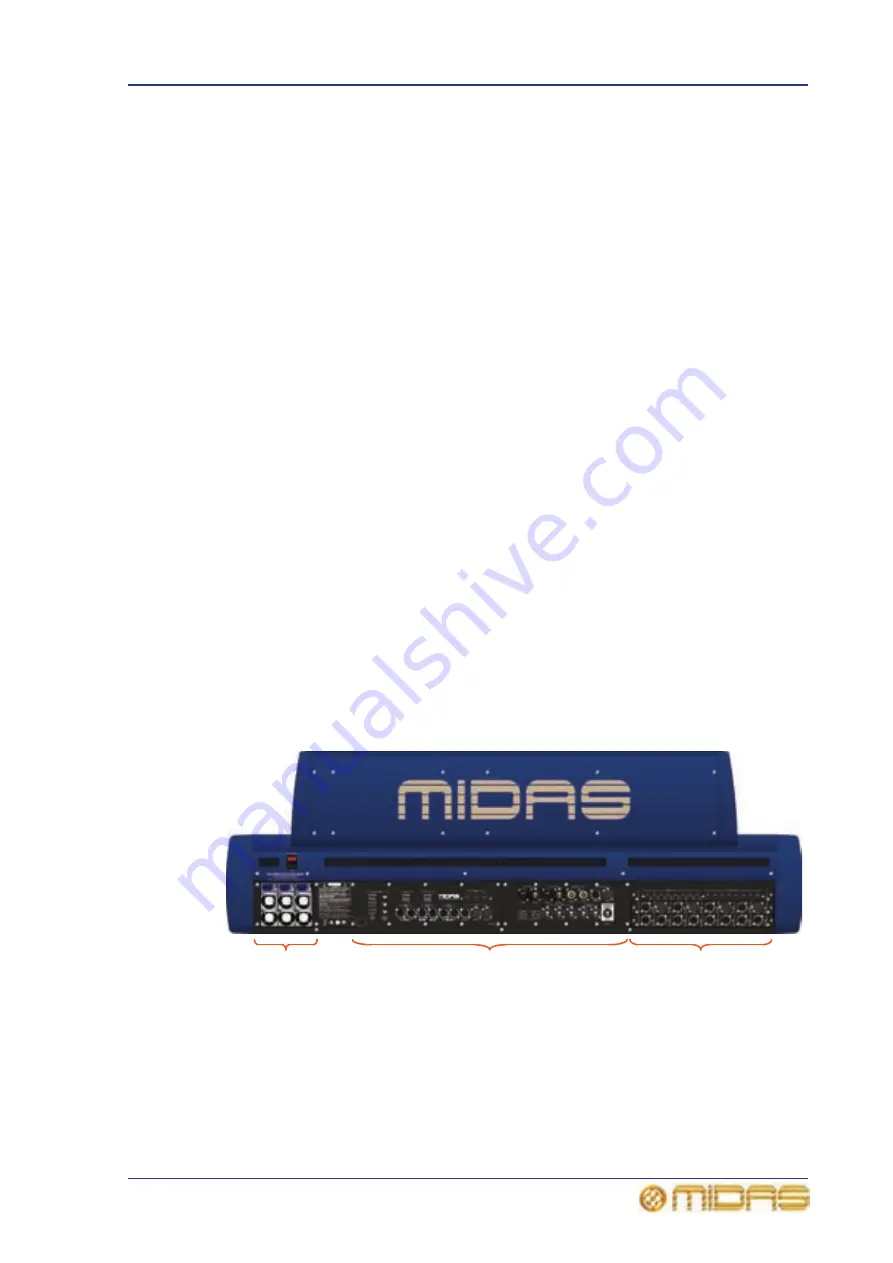
Front and rear panel connections
21
PRO6 Live Audio System
Owner’s Manual
Each GUI screen has its own default display (Overview and Meters as shown in
Figure 3), although either is selectable via the GUI main menu. The Overview screen
displays 12 inputs and two sets of eight outputs, and the Meters screen shows all the
meters, four inputs and a summary of the automation. Both screens have a banner at
the top, which is constantly displayed, and a channel strip down the outermost side.
The channel strips have a similar function to the ones on the control surface (see
Figure 2 on page 19), but provide extra functionality. Each displays an ‘overview’ of
the associated selected channel, which is divided into specific sections that provide
access to processing areas.
Front and rear panel connections
The PRO6 has connector panels on both the front and rear of the control centre.
The panel to the left of the mix bay GUI screen (item 7 in Figure 1) has an XLR socket
and two USB sockets for connecting a talk mic and USB devices, respectively. For
example, you can connect a USB memory stick for show file backup and transfer, or a
USB keyboard for text editing on the GUI. The top USB socket is associated with the
mix bay and the bottom one with the master bay.
There are also two panels at either end of the front of the control centre, under the
armrests. Each has a keyboard and phones socket. The left and right keyboard sockets
operate the mix and master bay GUI screens, respectively. The phones socket in the
left panel is for the monitor A section and the other one is for monitor B.
A connector panel on the rear of the PRO6 Control Centre has three main sections (see
below). On the left are three mains power inlet and ventilation assemblies, with a
DC power switch above. The mid-section contains connections for the audio, network,
communications, intercoms, synchronisation, external remote devices and peripheral
devices. The section on the right is the user-configurable modular I/O section.
The modular I/O section can house up to three of any of the following I/O modules in
any combination: DL441 analogue input module; DL442 analogue output module;
DL443 analogue insert input/output module; and DL452 digital in/out (AES/EBU)
module. This gives a maximum of 24 inputs and 24 outputs, if the appropriate cards
are fitted. The following diagram shows the standard I/O module configuration in which
the DL443 (top), DL441 (middle) and DL452 (bottom) are fitted.
For more information, see Chapter 29 "Panel Connections" on page 243.
Mains power
and ventilation
Audio, control
and networking
I/O
Summary of Contents for PRO6
Page 2: ......
Page 4: ......
Page 6: ......
Page 10: ......
Page 14: ...xvi Precautions PRO6 Live Audio System Owner s Manual...
Page 24: ...xxvi Contents PRO6 Live Audio System Owner s Manual...
Page 25: ...PRO6 Live Audio System Owner s Manual Volume 1 Overview...
Page 26: ......
Page 30: ...4 Chapter 1 Introduction PRO6 Live Audio System Owner s Manual...
Page 42: ...16 Chapter 2 PRO6 Live Audio System PRO6 Live Audio System Owner s Manual...
Page 50: ...24 Chapter 3 About The PRO6 Control Centre PRO6 Live Audio System Owner s Manual...
Page 51: ...PRO6 Live Audio System Owner s Manual Volume 1 Getting Started...
Page 52: ......
Page 59: ...PRO6 Live Audio System Owner s Manual Volume 2 Basic Operation Of The PRO6...
Page 60: ......
Page 64: ...38 Chapter 5 Before You Start PRO6 Live Audio System Owner s Manual...
Page 104: ...78 Chapter 8 Patching PRO6 Live Audio System Owner s Manual...
Page 131: ...PRO6 Live Audio System Owner s Manual Volume 3 Advanced Operation And Features...
Page 132: ......
Page 136: ...110 Chapter 10 Stereo Linking PRO6 Live Audio System Owner s Manual...
Page 144: ...118 Chapter 11 Panning PRO6 Live Audio System Owner s Manual...
Page 148: ...122 Chapter 12 Soloing PRO6 Live Audio System Owner s Manual...
Page 150: ...124 Chapter 13 Muting PRO6 Live Audio System Owner s Manual...
Page 192: ...166 Chapter 18 Copy And Paste PRO6 Live Audio System Owner s Manual...
Page 242: ...216 Chapter 24 User Libraries Presets PRO6 Live Audio System Owner s Manual...
Page 246: ...220 Chapter 25 File Management PRO6 Live Audio System Owner s Manual...
Page 250: ...224 Chapter 26 Using Other Devices With The PRO6 PRO6 Live Audio System Owner s Manual...
Page 267: ...PRO6 Live Audio System Owner s Manual Volume 4 Description...
Page 268: ......
Page 335: ...PRO6 Live Audio System Owner s Manual Volume 5 Appendices...
Page 336: ......
Page 365: ...Audio signal path 339 PRO6 Live Audio System Owner s Manual Audio signal path...
Page 366: ...340 Appendix C Klark Teknik DN370 GEQ PRO6 Live Audio System Owner s Manual...
Page 372: ...346 Appendix D Klark Teknik DN780 Reverb PRO6 Live Audio System Owner s Manual...
Page 376: ...350 Appendix E I O Modules PRO6 Live Audio System Owner s Manual...
Page 400: ...374 Appendix I Documentation PRO6 Live Audio System Owner s Manual...
Page 511: ...Return 485 XL8 Live Performance System Owner s Manual Gate Not applicable EQ Not applicable...
Page 612: ...586 Glossary PRO6 Live Audio System Owner s Manual...






























